Courtroom’s issuance of warrant marks first time South Korean authorities have sought to detain a sitting president.
A South Korean courtroom has issued an arrest warrant for impeached President Yoon Suk-yeol over his short-lived declaration of martial legislation in a historic first.
Seoul Western District Courtroom on Tuesday authorised the warrant following a request by the Joint Investigation Headquarters, which is investigating the embattled South Korean chief for rebellion and abuse of energy.
“The arrest warrant and search warrant for President Yoon Suk Yeol, requested by the Joint Investigation Headquarters, had been issued this morning,” the Joint Investigation Headquarters, which incorporates officers from the Corruption Investigation Workplace for Excessive-ranking Officers (CIO), police and the Ministry of Defence, mentioned in an announcement.
The transfer marks the primary time authorities have sought to detain a sitting South Korean president.
It’s unclear when authorities may try to take Yoon into custody.
Yoon’s safety element has beforehand blocked investigators from executing a variety of search warrants on the presidential workplace compound and the president’s official residence.
The Presidential Safety Service mentioned in an announcement shortly after the courtroom’s choice that it could deal with the warrant in accordance with authorized processes.
South Korean media have speculated that Yoon is unlikely to be arrested imminently as authorities would search to coordinate with the presidential safety service.
If Yoon is taken into custody, investigators would have 48 hours to determine whether or not to use for a warrant to detain him for additional questioning or launch him.
Yun Hole-geun, a lawyer for Yoon, mentioned in an announcement that the warrant was “unlawful and invalid”, arguing that the CIO doesn’t have the authority to research the president for rebellion.
Kwon Sung-dong, the ground chief of Yoon’s Folks’s Energy Get together, additionally criticised the courtroom’s choice to challenge a warrant, describing it as “inappropriate”.
Yoon faces doable life imprisonment, and even the demise penalty, over his transient imposition of martial legislation on December 3, which has plunged the East Asian nation into its largest political disaster in many years.
Whereas Yoon can’t be prosecuted for many crimes whereas he’s the president, he doesn’t have immunity in circumstances of rebel or treason.
Yoon has been suspended from his duties since December 14, when the Nationwide Meeting voted for his impeachment in a 204-85 vote.
In a deepening of the nation’s management disaster, the opposition-controlled legislature on Friday voted to additionally impeach appearing president Han Duck-soo, passing presidential authority to Deputy Prime Minister and Finance Minister Choi Sang-mok.
The Democratic Get together and several other minor opposition events voted to question Han over his refusal to instantly appoint three justices to fill vacancies on the Constitutional Courtroom, which is deliberating whether or not to uphold Yoon’s impeachment.
The courtroom has as much as six months to make its choice, after which Yoon will both be faraway from workplace or restored to the presidency.
Yoon has defended his transient martial legislation decree as authorized and mandatory, citing the specter of “anti-state forces” and obstructionism by his opposition rivals.


